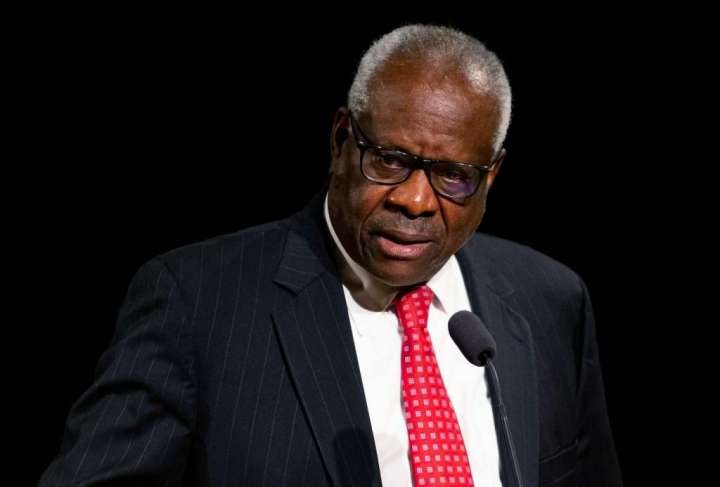What is worse than a dysfunctional family? An institution so dysfunctional, perhaps, that you can’t even call it a family with a straight face?
For Justice Thomas, the Roberts court is more feud than family

“The court that was together 11 years was a fabulous court. It was one you looked forward to being a part of,” Thomas said, setting the end of that era as 2005, when Chief Justice William H. Rehnquist died and Roberts replaced him.
“We actually trusted — we might have been a dysfunctional family, but we were a family,” Thomas said, adding, “You trusted each other, laughed together. You went to lunch together every day. … This is not the court of that era.”
Ouch. This is not the way Supreme Court justices talk about their institution. Not in public, anyway.
Follow Ruth Marcus‘s opinions
FollowRemember, after the tumultuous confirmation hearings for Justice Brett M. Kavanaugh, Justice Sonia Sotomayor, much to the displeasure of progressives outside the court, noted, “The nine of us are now a family. … This is our work family, and it’s just as important as our personal family.” After reports that Sotomayor stayed away from oral argument because Justice Neil M. Gorsuch declined to wear a face mask, the two issued a joint statement: “While we may sometimes disagree about the law, we are warm colleagues and friends.”
Yes, justices take sometimes intemperate jabs at colleagues’ reasoning in their opinions. Justice Antonin Scalia could be notoriously scathing about his fellow justices. In a 1989 abortion case, he said an argument by Justice Sandra Day O’Connor “cannot be taken seriously.” He ridiculed Justice Anthony M. Kennedy’s 2015 same-sex marriage ruling, saying “I would hide my head in a bag” rather than join such a decision and likened the writing to “the mystical aphorisms of the fortune cookie.”
And certainly courts past have had their share of intense internal disagreements, even hatreds. Justice Oliver Wendell Holmes famously described the institution as “nine scorpions in a bottle.”
But letting those tensions surface so openly is another matter. One breaking point, according to court insiders, came when Roberts switched his initial vote to strike down the Affordable Care Act, depriving conservatives of a majority to do away with the law. Conservatives, on the court and off, still seethe at what they see as a betrayal in which Roberts put his own reputation as an institutionalist above intellectual purity.
Now, any pretense of family harmony that remained is collapsing. During oral argument in Dobbs v. Jackson Women’s Health Organization, Roberts appeared ready to uphold Mississippi’s 15-week abortion ban. But, according to reporting around the leak of the draft opinion, he is balking at taking the final step of overruling Roe v. Wade outright.
Even before the unprecedented leak of the draft opinion in the Mississippi case, the court’s internal tensions spilled onto the editorial page of the Wall Street Journal, which expressed anxiety that Roberts “may be trying to turn another justice” — Kavanaugh being the most likely defector — to undo the majority.
Did someone aligned with the court’s conservatives not only whisper to the Journal’s editorial writers but also leak the draft opinion, in an effort to head that off? Or was the culprit a liberal infuriated by the court’s apparent willingness to abandon precedent?
Either way, as Thomas’s remarks made clear, the episode seems to have opened wounds on the court that will be slow to heal.
“When you lose … trust, especially in the institution that I’m in, it changes the institution fundamentally,” he said. “You begin to look over your shoulder. It’s like kind of an infidelity: You can explain it, but you can’t undo it.”
If Thomas was open, even indiscreet, about his unhappiness with the current court, he was similarly revealing, if not as intentionally, about how he sees his own role.
At various points in the comfortable setting of a conservative conference, Thomas let slip the mask of being an impartial justice and instead seemed to identify himself as a dedicated partisan — and an aggrieved one at that. “That is the way it has been for 40-plus years: us against the elite.”
Asked by an audience member about how Republicans responded to perceived Democratic mistreatment of conservative nominees, including Thomas himself, Thomas said, “We’ve never done it. You would never visit Supreme Court justices’ houses when things didn’t go our way. We didn’t throw temper tantrums. It is incumbent on us to always act appropriately and not to repay tit for tat. … We are to conduct ourselves better than they conduct themselves.”
He defended then-Senate Majority Leader Mitch McConnell’s decision not to hold a hearing for Merrick Garland when he was nominated by President Barack Obama. “The most they can point to is that Garland did not get a hearing. But he was not trashed,” Thomas said. “It was a rule that Joe Biden introduced, by the way, which is that you cannot get a hearing in the last year of an administration.”
Really? How is it Thomas’s role to opine on Garland’s treatment or to defend McConnell? (And, by the way, there was no actual “rule,” and if there were one, where was Thomas’s concern about Justice Amy Coney Barrett’s confirmation with just over a week to go before the 2020 presidential election?)
At his 1991 confirmation hearings, Thomas proclaimed that judges must “shed the baggage of ideology.” We all know how that worked out. Friday’s remarks illustrate how tribal Thomas’s ideological outlook remains — and how his strongest loyalties might remain with a different family altogether.






